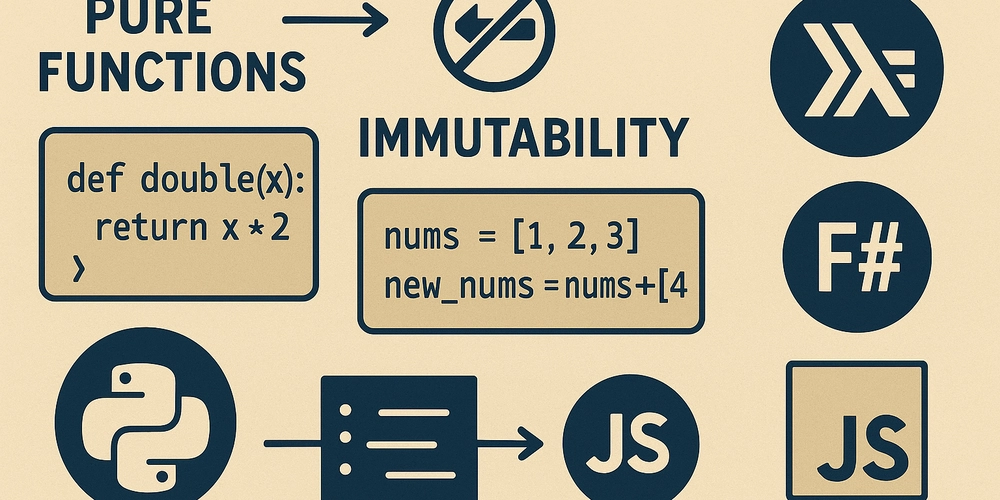Why Functional Programming vs. Imperative/OOP Matters
Functional programming (FP) emphasizes what you want—transforming data via pure functions—whereas imperative or object‐oriented (OOP) code focuses on how to modify state step by step. Below is a tiny comparison showing how the same task looks in each style: 1. Mapping over a list Imperative (JavaScript): const nums = [1, 2, 3, 4]; let doubled = []; for (let i = 0; i x * 2); console.log(doubled); // [2, 4, 6, 8] Notice how the FP version avoids manual loops and in‐place mutations. You simply describe “map each element to x * 2.” 2. Filtering objects Imperative (Python): people = [ {"name": "Alice", "age": 17}, {"name": "Bob", "age": 22}, {"name": "Cara", "age": 15}, {"name": "Dan", "age": 30} ] adults = [] for person in people: if person["age"] >= 18: adults.append(person) print(adults) # [{'name': 'Bob', 'age': 22}, {'name': 'Dan', 'age': 30}] Functional (Python): people = [ {"name": "Alice", "age": 17}, {"name": "Bob", "age": 22}, {"name": "Cara", "age": 15}, {"name": "Dan", "age": 30} ] # “filter” declares *what* we want: only those age ≥ 18 adults = list(filter(lambda p: p["age"] >= 18, people)) print(adults) # [{'name': 'Bob', 'age': 22}, {'name': 'Dan', 'age': 30}] Again, FP avoids manually managing a loop and a separate “append” step: you focus only on the filtering logic. 3. Computing a factorial Imperative/OOP (Java): public class Factorial { public static int factorial(int n) { int result = 1; for (int i = 2; i Integer factorial 0 = 1 factorial n = n * factorial (n - 1) main = print (factorial 5) -- 120 In Haskell’s FP style, there is no mutable result variable. You define the base case (0 → 1) and a single recursive rule (n → n * factorial (n-1)), clearly expressing what the factorial is. Why This Comparison Matters Readability & Maintainability: FP code often ends up shorter and more declarative. You see immediately “map these numbers” or “filter these objects” without scanning loop constructs. Fewer Side Effects: By relying on pure functions and immutable data, FP reduces bugs caused by inadvertent state changes—a huge win in concurrent or serverless environments. Testability: Pure functions with no hidden dependencies are easy to test in isolation. Imperative/OOP code often requires setting up state or mocking objects before testing. ❓ Want to dive deeper? In my full blog post I cover: Core FP concepts (pure functions, immutability, higher‐order functions, lazy evaluation) A survey of popular FP languages (Haskell, Scala, F#, JavaScript, Python) and real‐world use cases Practical tips for bringing FP thinking into your existing JavaScript or Python projects

Functional programming (FP) emphasizes what you want—transforming data via pure functions—whereas imperative or object‐oriented (OOP) code focuses on how to modify state step by step. Below is a tiny comparison showing how the same task looks in each style:
1. Mapping over a list
Imperative (JavaScript):
const nums = [1, 2, 3, 4];
let doubled = [];
for (let i = 0; i < nums.length; i++) {
doubled.push(nums[i] * 2);
}
console.log(doubled); // [2, 4, 6, 8]
Functional (JavaScript):
const nums = [1, 2, 3, 4];
// “map” declares *what* we want: double each element
const doubled = nums.map(x => x * 2);
console.log(doubled); // [2, 4, 6, 8]
Notice how the FP version avoids manual loops and in‐place mutations. You simply describe “map each element to x * 2.”
2. Filtering objects
Imperative (Python):
people = [
{"name": "Alice", "age": 17},
{"name": "Bob", "age": 22},
{"name": "Cara", "age": 15},
{"name": "Dan", "age": 30}
]
adults = []
for person in people:
if person["age"] >= 18:
adults.append(person)
print(adults)
# [{'name': 'Bob', 'age': 22}, {'name': 'Dan', 'age': 30}]
Functional (Python):
people = [
{"name": "Alice", "age": 17},
{"name": "Bob", "age": 22},
{"name": "Cara", "age": 15},
{"name": "Dan", "age": 30}
]
# “filter” declares *what* we want: only those age ≥ 18
adults = list(filter(lambda p: p["age"] >= 18, people))
print(adults)
# [{'name': 'Bob', 'age': 22}, {'name': 'Dan', 'age': 30}]
Again, FP avoids manually managing a loop and a separate “append” step: you focus only on the filtering logic.
3. Computing a factorial
Imperative/OOP (Java):
public class Factorial {
public static int factorial(int n) {
int result = 1;
for (int i = 2; i <= n; i++) {
result *= i;
}
return result;
}
public static void main(String[] args) {
System.out.println(factorial(5)); // 120
}
}
Functional (Haskell):
-- “recursion” and no mutable state
factorial :: Integer -> Integer
factorial 0 = 1
factorial n = n * factorial (n - 1)
main = print (factorial 5) -- 120
In Haskell’s FP style, there is no mutable result variable. You define the base case (0 → 1) and a single recursive rule (n → n * factorial (n-1)), clearly expressing what the factorial is.
Why This Comparison Matters
- Readability & Maintainability: FP code often ends up shorter and more declarative. You see immediately “map these numbers” or “filter these objects” without scanning loop constructs.
- Fewer Side Effects: By relying on pure functions and immutable data, FP reduces bugs caused by inadvertent state changes—a huge win in concurrent or serverless environments.
- Testability: Pure functions with no hidden dependencies are easy to test in isolation. Imperative/OOP code often requires setting up state or mocking objects before testing.
❓ Want to dive deeper? In my full blog post I cover:
- Core FP concepts (pure functions, immutability, higher‐order functions, lazy evaluation)
- A survey of popular FP languages (Haskell, Scala, F#, JavaScript, Python) and real‐world use cases
- Practical tips for bringing FP thinking into your existing JavaScript or Python projects





























































_.png)
















































































































![[The AI Show Episode 151]: Anthropic CEO: AI Will Destroy 50% of Entry-Level Jobs, Veo 3’s Scary Lifelike Videos, Meta Aims to Fully Automate Ads & Perplexity’s Burning Cash](https://www.marketingaiinstitute.com/hubfs/ep%20151%20cover.png)
























































































































![[FREE EBOOKS] Solutions Architect’s Handbook, Continuous Testing, Quality, Security, and Feedback & Four More Best Selling Titles](https://www.javacodegeeks.com/wp-content/uploads/2012/12/jcg-logo.jpg)





![From electrical engineering student to CTO with Hitesh Choudhary [Podcast #175]](https://cdn.hashnode.com/res/hashnode/image/upload/v1749158756824/3996a2ad-53e5-4a8f-ab97-2c77a6f66ba3.png?#)






































































































































_Michael_Vi_Alamy.jpg?width=1280&auto=webp&quality=80&disable=upscale#)




































































































![watchOS 26 May Bring Third-Party Widgets to Control Center [Report]](https://www.iclarified.com/images/news/97520/97520/97520-640.jpg)

![AirPods Pro 2 On Sale for $169 — Save $80! [Deal]](https://www.iclarified.com/images/news/97526/97526/97526-640.jpg)









































































